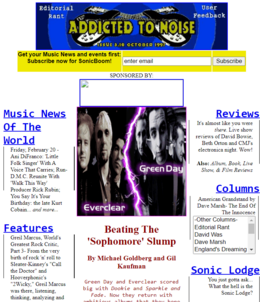
The World Wide Web is an information system that enables content sharing over the Internet through user-friendly ways meant to appeal to users beyond IT specialists and hobbyists. It allows documents and other web resources to be accessed over the Internet according to specific rules of the Hypertext Transfer Protocol (HTTP).

The Internet Archive is an American nonprofit digital library founded on May 10, 1996, and chaired by free information advocate Brewster Kahle. It provides free access to collections of digitized materials including websites, software applications, music, audiovisual and print materials. The Archive also advocates for a free and open Internet. As of February 4, 2024, the Internet Archive holds more than 44 million print materials, 10.6 million videos, 1 million software programs, 15 million audio files, 4.8 million images, 255,000 concerts, and over 835 billion web pages in its Wayback Machine. Its mission is committing to provide "universal access to all knowledge".

A digital music store is a business that sells digital audio files of music recordings over the Internet. Customers gain ownership of a license to use the files, in contrast to a music streaming service, where they listen to recordings without gaining ownership. Customers pay either for each recording or on a subscription basis. Online music stores generally also offer partial streaming previews of songs, with some songs even available for full length listening. They typically show a picture of the album art or of the performer or band for each song. Some online music stores also sell recorded speech files, such as podcasts, and video files of movies.
MP3.com is a web site operated by Paramount Global publishing tabloid-style news items about digital music and artists, songs, services, and technologies. It is better known for its original incarnation as a legal, free music-sharing service, named after the popular music file format MP3, popular with independent musicians for promoting their work. That service was shut down on December 2, 2003, by CNET, which, after purchasing the domain name, established the current MP3.com site.
A favicon, also known as a shortcut icon, website icon, tab icon, URL icon, or bookmark icon, is a file containing one or more small icons associated with a particular website or web page. A web designer can create such an icon and upload it to a website by several means, and graphical web browsers will then make use of it. Browsers that provide favicon support typically display a page's favicon in the browser's address bar and next to the page's name in a list of bookmarks. Browsers that support a tabbed document interface typically show a page's favicon next to the page's title on the tab, and site-specific browsers use the favicon as a desktop icon.
GeoCities, later Yahoo! GeoCities, was a web hosting service that allowed users to create and publish websites for free and to browse user-created websites by their theme or interest, active from 1994 to 2009. GeoCities was started in November 1994 by David Bohnett and John Rezner, and was named Beverly Hills Internet briefly before being renamed GeoCities. On January 28, 1999, it was acquired by Yahoo!, at which time it was reportedly the third-most visited website on the World Wide Web.

eMusic is an online music and audiobook store that operates by subscription. In exchange for a monthly subscription eMusic users can download a fixed number of MP3 tracks per month. eMusic was established in 1998, is headquartered in New York City with an office in London, and is owned by TriPlay.

AllMusic is an American online music database. It catalogs more than three million album entries and 30 million tracks, as well as information on musicians and bands. Initiated in 1991, the database was first made available on the Internet in 1994. AllMusic is owned by RhythmOne.

The "Dancing Baby", also called "Baby Cha-Cha" or "the Oogachacka Baby", is an internet meme of a 3D-rendered animation of a baby performing a cha-cha type dance. It quickly became a media phenomenon in the United States and one of the first viral videos in the mid-late 1990s.
Samuel Clarke "Sandy" Pearlman was an American music producer, artist manager, music journalist and critic, professor, poet, songwriter, and record company executive. He was best known for founding, writing for, producing, or co-producing many LPs by Blue Öyster Cult, as well as producing notable albums by The Clash, The Dictators, Pavlov's Dog, and Dream Syndicate; he was also the founding Vice President of eMusic.com. He was the Schulich Distinguished Professor Chair at the Schulich School of Music at McGill University in Montreal, and from August 2014 held a Marshall McLuhan Centenary Fellowship at the Coach House Institute (CHI) of the University of Toronto Faculty of Information as part of the CHI's McLuhan Program in Culture and Technology.

Adobe Flash animation is an animation that is created with the Adobe Animate platform or similar animation software and often distributed in the SWF file format. The term Adobe Flash animation refers to both the file format and the medium in which the animation is produced. Adobe Flash animation has enjoyed mainstream popularity since the mid-2000s, with many Adobe Flash-animated television series, television commercials, and award-winning online shorts being produced since then.

Weather Underground is a commercial weather service providing real-time weather information over the Internet. It provides weather reports for most major cities around the world on its Web site, as well as local weather reports for newspapers and third-party sites.
The online service imeem was a social media website where users interacted with each other by streaming, uploading and sharing music and music videos. It operated from 2003 until 2009 when it was shut down after being acquired by MySpace.
Internet Citizen's Band is an early Internet chat program and its associated protocol. It was released in 1989.
Deth Specula is a Santa Cruz "neo-bronto" five-piece rock band. Deth Specula was one of the first ten bands on The Internet Underground Music Archive and used the Internet to broadcast a live music concert from the Cowell Courtyard at the SCO Forum held on the University of California in Santa Cruz on August 23, 1994. This was the first time a live music concert was broadcast over the Internet and the second netcast ever. The first song ever broadcast in a live concert over the Internet was "Internet Band", a Deth Specula parody of the Grand Funk Railroad song "We're An American Band".

Addicted to Noise (ATN) was an American online music magazine in the early days of the World Wide Web. Founded in 1994 by ex-Rolling Stone associate editor and senior writer Michael Goldberg and online music pioneer Jon Luini, it published its first issue on December 1, 1994 and was the first online magazine to include audio samples alongside new album reviews. It published its final issue on July 3, 2000.
In the first decade of the 21st century, the rise of digital media on the internet and computers as a central and primary means to record, distribute, store, and play music caused widespread economic changes in the music industry. The rise of digital media with high-speed internet access fundamentally changed the relationships between artists, record companies, promoters, retail music stores, the technology industry, and consumers. The rise of digital music consumption options contributed to several fundamental changes in consumption. One significant change in the music industry was the remarkable decline of conventional album sales on CD and vinyl. With the à la carte sales models increasing in popularity, consumers no longer downloaded entire albums but rather chose single songs.

Internet pornography is any pornography that is accessible over the Internet; primarily via websites, FTP connections, peer-to-peer file sharing, or Usenet newsgroups. The greater accessibility of the World Wide Web from the late 1990s led to an incremental growth of Internet pornography, the use of which among adolescents and adults has since become increasingly popular.

Elizabeth Jocelyn "Jake" Feinler is an American information scientist. From 1972 until 1989 she was director of the Network Information Systems Center at the Stanford Research Institute. Her group operated the Network Information Center (NIC) for the ARPANET as it evolved into the Defense Data Network (DDN) and the Internet.